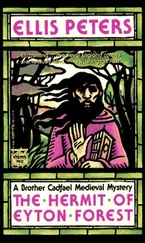“Then what are we waiting for?” demanded Mark simply, and turned his horse towards the west.
At the church of Saint Deiniol, several miles southwest from Bangor and perhaps two miles from the strait, they got word of her at last. She must have kept to the old, direct road, the same Owain and his host would take, but hours ahead of them. The only puzzle was why it had taken her so long to reach that point, for when they enquired of the priest there was no hesitation, but yes, she had lighted down here to ask directions only late the previous evening, about Vespers.
“A young woman on a light roan, and all alone. She asked her way to the cell of Nonna. Due west from here it lies, in the trees near the water. I offered her shelter for the night, but she said she would go to the holy woman.”
“She would find the cell deserted,” said Cadfael. “Bishop Meurig feared for the anchoress, and sent to bring her into Bangor. From which direction did the girl ride in?”
“Down out of the forests, from the south. I did not know,” said the priest, distressed, “that she would find the place empty. I wonder, poor child, what she would do? There would still be time enough for her to find refuge in Bangor.”
“That I doubt she would do,” said Cadfael. “If she came to the cell only so late, she might well bide the night over there, rather than risk moving by darkness.” He looked at Mark, in no doubt already what that young man would be thinking. On this journey Mark had the governance, not for the world would Cadfael have robbed him of it by word or act.
“We will go and look for her at the hermitage,” said Mark firmly, “and if she is not there, we will separate and try whatever tracks seem most likely to offer her refuge. In these lowland pastures there must be homesteads she may have tried.”
“Many will have taken advice,” the priest suggested, shaking his head dubiously. “In a few weeks they would have been moving their herds and flocks into the uplands, even without this threat. Some may have moved early, rather than risk being plundered.”
“We can but make the assay,” said Mark stoutly. “If need be, we’ll take to the hills ourselves in search of her.”
And forthwith he made a brisk reverence to their informant, and wheeled his horse and set off due west, straight as an arrow. The priest of Saint Deiniol looked after him with raised brows and an expression half amused and half solicitous, and shook his head doubtfully.
“Would that young man be seeking the girl out of the goodness of his heart? Or for himself?”
“Even for that young man,” Cadfael said cautiously, “I would not presume to say anything is impossible. But it comes as near as makes no matter. Any creature in peril of death or harm, be it man, woman, plough horse, or Saint Melangell’s hare, could draw him through moss or quicksand. I knew I should never get him back to Shrewsbury while Heledd was astray.”
“You are turning back here yourself?” the priest demanded drily.
“Small chance! If he is bound to her, fellow-voyager to his fellow, so am I to him. I’ll get him home!”
“Well, even if his concern for her is purer than dew,” said the priest with conviction, “he had best take heed to his vows when he does find her. For she’s a bonny black maid as ever I saw. I was glad of my evening years when I dared bid her shelter the night over in my house. And thankful when she would not. And that lad is at the best of the morning, tonsure or no tonsure.”
“The more reason I should go after him,” agreed Cadfael. “And my thanks to you for the good word. For all the good words! I’ll see them strictly delivered when I overtake him.”
“Saint Nonna,” said Cadfael didactically, threading the woodland belt that spread more than a mile inland from the strait, “was the mother of Saint David. She has many sacred wells about the country, that give healing, especially to the eyes, even to curing blindness. This holy woman must have chosen to name herself after the saint.”
Brother Mark pursued his determined way along the narrow ride, and said nothing. On either hand the trees glittered in moist sunlight after the early morning showers, mixed woodland sufficiently open to let in the radiance of early afternoon, sufficiently close to be ridden in single file, and all just coming into the first full leaf, young and fresh and full of birds. Every Spring is the only Spring, a perpetual astonishment. It bursts upon a man every year, thought Cadfael, contemplating it with delight in spite of all anxieties, as though it had never happened before, but had just been shown by God how to do it, and tried, and found the impossible possible.
Ahead of him in the worn grass of the ride Mark had halted, staring ahead. Between the trees, here thinning, open light shone before them, at a little distance still, but now not very far, and shimmering with reflected gleams from water. They were nearing the strait. And on Mark’s left hand a narrow footway twined in among the trees to a low-roofed hut some yards aside from the path.
“This is the place.”
“And she was here,” said Cadfael. The wet grass, unshaken on either side by any wind, had retained the soft dew of rain that dimmed its new green to a silver grey, but through it a horse had certainly passed, leaving his darker trail, and brushing before him the tips of new growth, for the passage to the cell was very narrow. The ride in which they had halted was in regular use, they had not thought to examine it as they rode. But here between the encroaching bushes a horse had certainly passed since the rain. And not inward, but outward. A few young shoots had been broken at the tip, leaning towards the open ride, and the longer grasses darkened by hooves clearly showed the direction in which they had been brushed in passing. “And is gone,” said Cadfael, “since the morning.”
They dismounted, and approached the cell on foot. Built little and low, and one room only, for a woman who had almost no needs at all, beyond her small stone-built altar against one wall, and her plain straw pallet against another, and her small cleared space of garden behind for vegetables and herbs. Her door was drawn to, but had no lock to be seen without, and no bar within, only a latch that any wayfarer could lift and enter. The place was empty now. Nonna had obeyed the bishop’s expressed wish, and allowed herself to be escorted into shelter in Bangor, how willingly there was no knowing. If she had had a guest here in her absence, the guest too was gone. But in a patch of clear turf between the trees the grass had been grazed, and hooves had ranged on a long tether, leaving their traces before the rain fell, for drops still hung on the grasses, unshaken. And in one place the beast had left his droppings, fresh and moist still, but already cold.
“She passed the night here,” said Cadfael, “and with the morning she left. After the rain she left. Which way, who knows! She came to Llandeiniolen from inland, out of the hills and through the forest, so the priest said. Had she some place of refuge in mind up there, some kinsman of Meirion’s who might take her in? And did she find that place, too, already deserted, and think of the anchoress as her next hope? It would account for why it took her so long to get here. But as for where she is gone now, how can we tell?”
“She knows by now of the danger from the sea,” said Mark. “Surely she would not go on westward into such a peril? But back towards Bangor and her marriage? She has already risked much to evade it. Would she make her way back to Aber, and her father? That would not deliver her from this marriage, if she is so set against it.”
“She would not do it,” said Cadfael, “in any case. Strange as it may be, she loves her father as much as she hates him. The one is the reflection of the other. She hates him because her love is far stronger than any love he has for her, because he is so ready and willing to give her up, to put her away by any means possible, so that she may no longer cast a cloud over his reputation and his advancement. Very clearly she declared herself once, as I remember.”
Читать дальше












